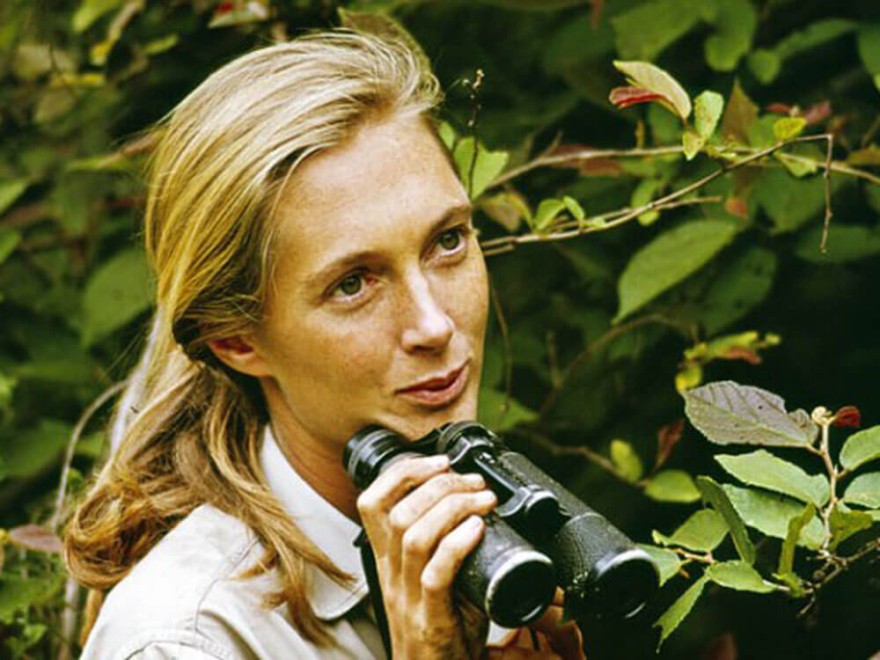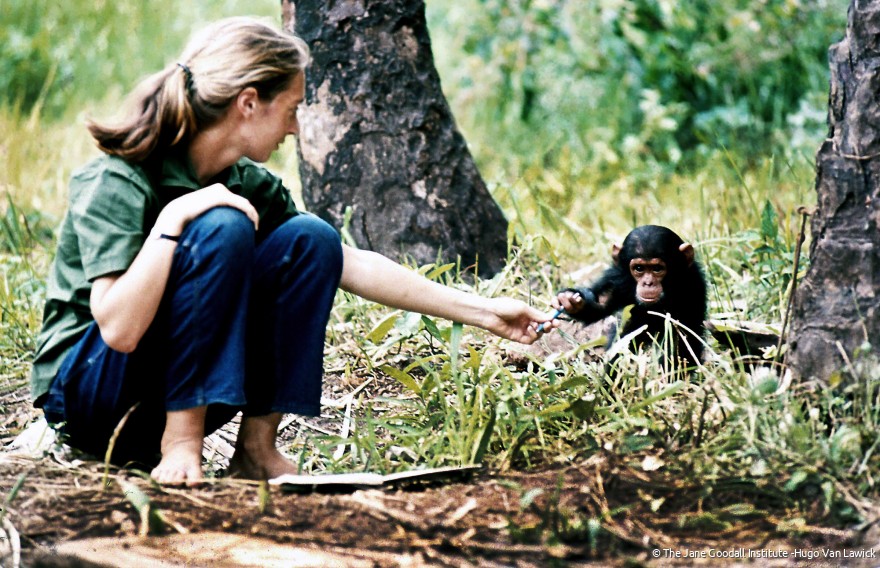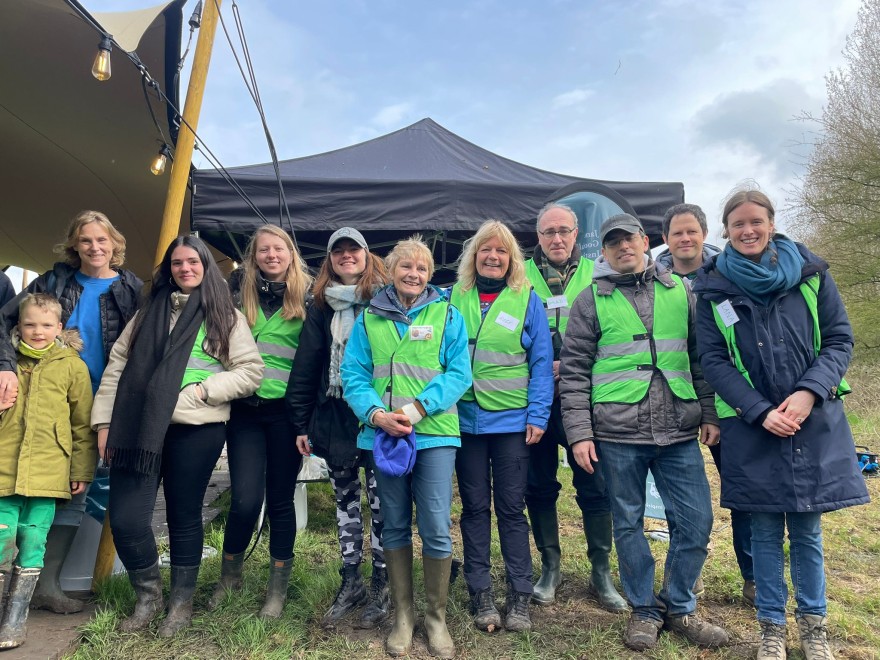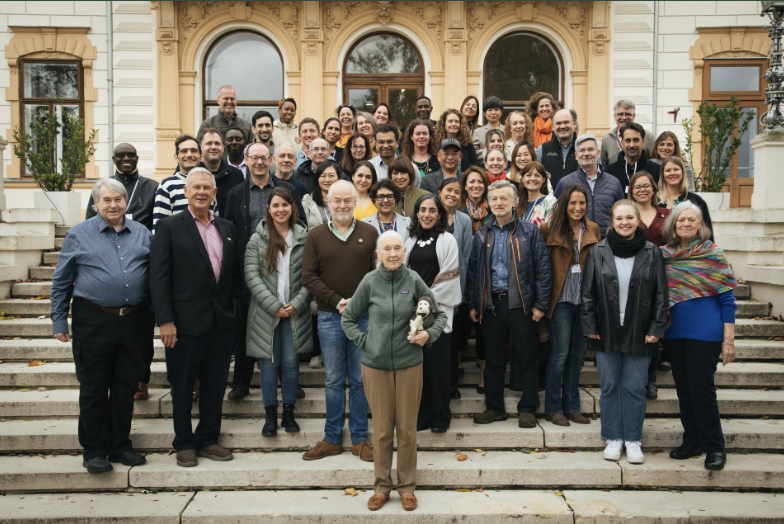"You can't get through a day without making an impact
on the world around you. What you do makes a difference, and
you have to decide what kind of difference you want to make."
Dr. Jane Goodall
Who is Dr. Jane Goodall?
Dr. Jane Goodall, DBE (Dame Commander of the Order of the British Empire), founder of the Jane Goodall Institute and United Nations Messenger of Peace, was a world-renowned ethologist and activist who inspires understanding and action on behalf of the natural world.
She was known for her pioneering research on wild chimpanzees in Tanzania's Gombe Stream National Park, which forever changed our view of our relationship with the rest of the animal kingdom. This transformative research continues today as the world's longest-running study of wild chimpanzees. Jane's work builds on scientific innovations, with a lifetime of advocacy, including pioneering work through her international organization, the Jane Goodall Institute, which promotes community conservation, animal welfare, science and youth empowerment through the Roots & Shoots programme.
Jane died on October 1st 2025 and never stopped to champion the cause of animals and wildlife and connect with global audiences, giving lectures and making recordings such as her podcast "Jane Goodall Hopecast." In 2021, she received the Templeton Prize for her groundbreaking discoveries. That same year, she published her latest book, "The Book of Hope: A Survival Guide for Trying Times."
Jane was a global icon spreading hope and turned it into significant positive impact to create a better world for people, other animals and the planet we share.
The early days
In the late fifties, Jane Goodall received an invitation that would change her life forever. A childhood friend in Kenya asked her if she would want to visit her. Would she ever! Months later and after making savings, Jane arrived in Africa in 1957. Eager to stay longer, she started working as a secretary for anthropologist Dr Louis Leakey. In those times, hardly anything was known about the behaviour of great apes. Leakey was aware of how much Jane knew about animals, and how patient and eager she was to learn. He asked her whether she wanted to study wild chimpanzees in a remote part of Tanzania. It may have been the best question he ever asked! After many preparations and getting her mother to Africa as a companion during the first months, Jane Goodall set foot in Gombe, on the shores of Lake Tanganyika, on 14 July 1960. The rest is history.

Facts about Jane
Jane was vegan since 2015, and she strongly believes in the benefits of a vegan diet for the planet and animal welfare. She has also written a vegan cookbook titled “#EATMEATLESS: Good for Animals, the Earth & All” to inspire us all to shift to a plant-based diet.

She was awarded a Ph.D. in ethology by Cambridge University in 1966, being one of the few people to receive a doctoral title without a college degree. The title of her thesis was “Behaviour of free-living chimpanzees”. In the decades after, Jane received many awards, both at home in Britain and abroad. She was also one of the few women in the world to have both the titles of Dame of the British Empire and Doctor.

Her love for chimpanzees had a very early start. When she was one year old, her father gifted her a toy chimpanzee named Jubilee. Jane fell in love with it, and she still kept it in her home in England.

Jane’s mother, Vanne Morris-Goodall, steadily supported Jane’s dreams. She accompanied Jane to her first stay in Africa, as British authorities found it inappropriate for a young woman to undertake such a trip by herself.
Dr. Goodall's Research
Dr. Jane Goodall was one of the world’s most renowned ethologists. She started studying chimps in the wild in 1960. The day when she set her foot in Gombe Stream National Park in Tanzania is today celebrated as the World’s Chimp Day (14 July).
Jane was the first to carry out a long-term study on great apes in the wild. She documented chimpanzee behaviour by observing them on a daily basis for months at a time. This required the chimps getting used to her and ignoring her which took months. Equipped with a notebook, pencil and a pair of binoculars, she noticed the complex community interactions and close bonds between individuals. Jane followed chimps, keeping a respectful distance, to watch their daily routines, how they feed, communicate, build a nest for the night and with whom they sleep. Many of these early discoveries are found in her book In the Shadow of Man.

4 things Jane standed for
HOPE
Jane was a beacon of hope, and creating hope was her single-most goal. She believed that a better world is possible if we all do our bit. Real hope requires action and engagement.
ACTION
Jane inspired action on behalf of all living things and the planet we share. She wanted people to take action no matter how small. The small daily actions of millions of people can have a huge impact. “Every day we make many small decisions which leave an impact, but we can choose which impact we want to make”.
ENDURANCE
Jane made an impact wherever she went, which gave her the energy and positive vibes to keep going. Already in the early days, she had made clear that she would go on protecting the chimpanzees and their habitats until she dies. She has not wavered.
COMPASSION
As most people will intuitively sense, compassion is a prerequisite for living a dignified life in a peaceful world. No matter how intelligent we consider ourselves as a species, we are nowhere without compassion, compassion for future generations and the health of the planet.
Her recent publications
As a child, Jane’s dream was “going to Africa, live with animals, … and write books about them”. The last part is the least talked about, but she proved being a brilliant writer and storyteller. All her books are written in fluent yet simple prose with subtle British humor, and a good balance between scientific rigor, personal views and thoughts and of course, oozing with compassion towards both people and animals. There are also countless children’s books by and about Jane, and about the causes that she supported.
The Jane Goodall Institute Belgium
The Jane Goodall Institute was founded in 1977 and continues Dr. Goodall’s pioneering research on chimpanzee behaviour — research that transformed scientific perceptions of the relationship between humans and animals. What began as an effort to protect chimpanzees and their habitats has since evolved into a worldwide movement that now inspires a generation of young global citizens and supports community-centered conservation in Africa.
The Belgian Institute was founded in 2005 with a focus on tree planting and Roots & Shoots. Today we continue to grow and lead the way in growing participation to change the world.

The Jane Goodall Institute Global
The mission of the Jane Institute Global is to support wildlife research, education and conservation. Established in 2013, JGIG's distinctive role is to bring the different JGI Chapters and offices together for cohesive, efficient and effective community conservation across the world. They promote informed and compassionate action to improve the environment shared by all Earth’s living creatures.
There are over 30 chapters around the world.






